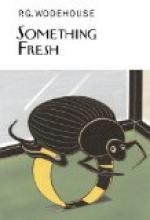He was conscious of strange thrills. This, he told himself, was the only possible mode of life with spring in the air. He had always been partial to those historical novels in which the characters are perpetually vaulting on chargers and riding across country on perilous errands. This leaping into taxicabs to answer stimulating advertisements in the Morning Post was very much the same sort of thing. It was with fine fervor animating him that he entered the gloomy offices of Mainprice, Mainprice & Boole. His brain was afire and he felt ready for anything.
“I have come in ans—” he began, to the diminutive office boy, who seemed to be the nearest thing visible to a Mainprice or a Boole.
“Siddown. Gottatakeyerturn,” said the office boy; and for the first time Ashe perceived that the ante-room in which he stood was crowded to overflowing.
This, in the circumstances, was something of a damper. He had pictured himself, during his ride in the cab, striding into the office and saying. “The delicate and dangerous enterprise. Lead me to it!” He had not realized until now that he was not the only man in London who read the advertisement columns of the Morning Post, and for an instant his heart sank at the sight of all this competition. A second and more comprehensive glance at his rivals gave him confidence.
The Wanted column of the morning paper is a sort of dredger, which churns up strange creatures from the mud of London’s underworld. Only in response to the dredger’s operations do they come to the surface in such numbers as to be noticeable, for as a rule they are of a solitary habit and shun company; but when they do come they bring with them something of the horror of the depths.
It is the saddest spectacle in the world—that of the crowd collected by a Wanted advertisement. They are so palpably not wanted by anyone for any purpose whatsoever; yet every time they gather together with a sort of hopeful hopelessness. What they were originally—the units of these collections—Heaven knows. Fate has battered out of them every trace of individuality. Each now is exactly like his neighbor—no worse; no better.
Ashe, as he sat and watched them, was filled with conflicting emotions. One-half of him, thrilled with the glamour of adventure, was chafing at the delay, and resentful of these poor creatures as of so many obstacles to the beginning of all the brisk and exciting things that lay behind the mysterious brevity of the advertisement; the other, pitifully alive to the tragedy of the occasion, was grateful for the delay.
On the whole, he was glad to feel that if one of these derelicts did not secure the “good pay for the right man,” it would not be his fault. He had been the last to arrive, and he would be the last to pass through that door, which was the gateway of adventure—the door with Mr. Boole inscribed on its ground glass, behind which sat the author of the mysterious request for assistance, interviewing applicants. It would be through their own shortcomings—not because of his superior attractions—if they failed to please that unseen arbiter.




